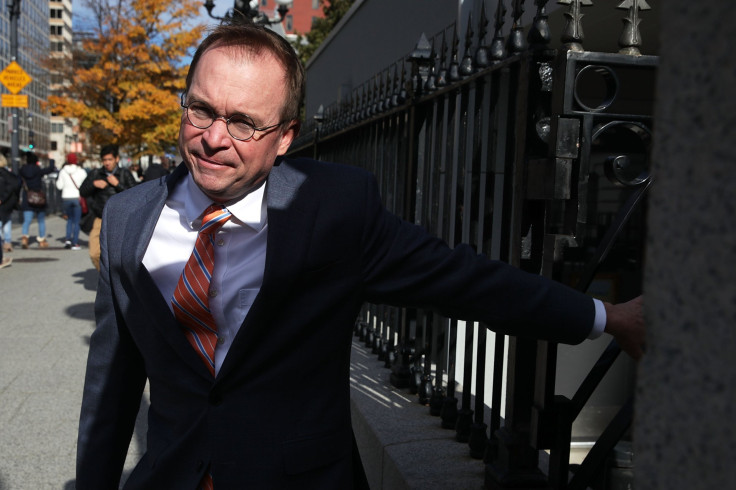Trump And Lawmakers Got Cash From Payday Lenders, Then Weakened Lending Rules

Less than two months after President Donald Trump tapped his budget director to run the independent federal agency tasked with protecting U.S. consumers from harmful and predatory financial practices, the agency has moved to undo a rule intended to prevent payday lenders from preying on low-income Americans. The reversal — which follows recent congressional proposals with the same objective — is a major win for the $40 billion payday lending industry, which has recently started delivering big money to Trump and to congressional critics of the Consumer Financial Protection Bureau (CFPB).
The payday lending and title loan industry has been battling the CFPB since Congress created the bureau in 2010 — and the fight has intensified since the bureau started crafting rules to regulate short-term lending in 2015. Since then, payday lenders have given $1.5 million to congressional lawmakers and another $300,000 to the Republican National Committee and the National Republican Congressional Committee. The industry also spent another $6.2 million on politics at the state level to combat regulation over the same time period, according to the National Institute on Money in State Politics. (A patchwork system of state-based laws currently governs the industry; a handful of states ban payday loans entirely.)
The industry’s shrewdest investment may have been the money it delivered to Trump after he won the 2016 election. While payday lenders weren’t lining up to support Trump during the presidential election, in January after Trump’s win, Advance America, the nation’s biggest payday lender, donated $250,000 to Trump’s inauguration. Title loan magnate Rod Aycox and his wife each donated $500,000 for the event; payday lender Checks into Cash chipped in another $25,000. In November, the Community Financial Services Association of America, the industry’s trade group, announced its annual conference and expo would be held at the Trump National Doral resort in Miami.
As that money flowed to Trump and his business empire, the Trump administration has made moves to help the industry — in particular, it took decisive action to undermine the CFPB’s previous efforts to regulate lenders.
Under Obama-appointed CFPB director Richard Cordray, the agency in October finalized a 1690-page rules package designed to protect consumers from predatory payday lenders. Shortly after, however, Cordray stepped down to launch a Democratic bid for the governor of Ohio. In response, Trump tapped the White House budget director, former South Carolina congressman and longtime payday lending industry ally Mick Mulvaney as acting director of the agency, over objections from Democrats, who insisted the law required Cordray’s second-in-command, Leandra English, to assume the role.
Mulvaney received $55,000 in campaign contributions from payday lenders during the course of his political career, and much of that career has been spent pressuring federal regulators to back off payday lending rules. As CFPB chief, he has now moved to roll back payday lending regulations, which would force payday lenders to determine a borrower’s ability to repay a loan within 30 days before issuing the loan.
“The Bureau intends to engage in a rulemaking process so that the Bureau may reconsider the Payday Rule,” the CFPB said in brief Tuesday press release. A day later, the bureau announced it was calling for evidence that the CFPB is fulfilling its mission as part of a review of the entire agency.
“Much can be done to facilitate greater consumer choice and efficient markets, while vigorously enforcing consumer financial law in a way that guarantees due process,” Mulvaney said in a statement. “I look forward to receiving public comments in response to this call for evidence and encourage all interested parties to participate.”
Also on Wednesday, the CFPB sent its quarterly budget request to the Federal Reserve. It requested zero dollars.
Here's a copy of the CFPB funding request for ... wait for it ... $0 (zero dollars, zilch, nada)
— Ryan Barber (@cryanbarber) January 18, 2018
Full letter👉 https://t.co/a05MWYLmjt pic.twitter.com/qf6ix1sXwT
Congress Has Been Moving To Weaken The CFPB
The CFPB, which added pro-business language to its mission statement shortly after Mulvaney took over, isn’t acting alone in its efforts to protect payday lenders.
Congressional Republicans have introduced legislation that would roll back the CFPB’s payday loan regulations, even though recent polling has shown 70 percent of Americans believe the industry should be more regulated than it currently is.
Payday loans are short-term loans of less than $500 which can come with up to 390 percent interest. They often ensnare low-income workers in “debt traps” — ruinous cycles of borrowing to pay off previous loans that lead to ever-increasing levels of debt. A 2014 CFPB study found that 80 percent of payday loans are given to borrowers who already have an outstanding payday loan, and that the majority of payday loan borrowers pay more in fees than the loan is worth. It also found that half of all payday loans are part of a sequence of loans at least 10 loans long.
Industry allies claim payday and title loans (similar loans in which a car’s title is used as collateral) are the only way low-income Americans can access credit. But activists say the “debt trap” is not the industry’s byproduct — but its cornerstone.
“A payday loan is like throwing an anvil in an already-sinking boat. It sinks people into an inescapable financial situation,” Diane Standaert, director of state policy at the nonprofit Center for Responsible Lending, told International Business Times. “They’re designed to keep people trapped payday after payday after payday.”
Cash Flowed To Lawmakers Who Pressured Regulators To Back Off Rules
The move to roll back the regulations follows a trio of bills critics say would create more opportunities for payday lenders. One of the bills, introduced in December, explicitly seeks to undo the CFPB payday lending rule. Another, introduced in February of last year, would entirely eliminate the CFPB, which Sen. Ted Cruz, the bill’s sponsor, said is engaging in “financial activism” and stunting economic growth. A federal appeals court ruled in 2016 that the CFPB has an unconstitutional structure because the CFPB director can be fired by the president only for cause, an arrangement supporters say ensures the bureau’s independence.

Letters obtained by IBT show House lawmakers also working behind the scenes to slow CFPB efforts to regulate the industry, or tilt regulation toward lenders. One letter, sent in 2015 after the CFPB announced it would begin crafting rules to regulate the industry, asks then-CFPB director Cordray to “work in consultation with industry stakeholders to ensure a fair and transparent process.” In an April 2016 letter, lawmakers told Cordray that they were “concerned with the Bureau’s disregard for state and tribal sovereignty and the existing state-based regulatory framework,” noting that “your regulatory posture ignored the popular voice of states and sovereign Indian tribes that have carefully crafted laws to balance consumer protection and access to credit.”
Mulvaney was the only member of Congress to sign all five letters reviewed by IBT, which were obtained through a Freedom of Information Act request. Several of the signees received campaign contributions from payday lenders, their executives and trade associations in the weeks — and in some cases, days — before the letters were sent. Of the top ten House recipients of payday lending industry cash during the 2016 election cycle, eight of them were signatories of at least one of the letters.
As a representative from South Carolina, home of payday giant Advance America, Mulvaney signed five letters in 2015 and 2016 to the CFPB, demanding the bureau delay, reexamine or outright kill payday lending rules. Mulvaney received $26,500 in contributions from the payday lending industry over that same time period.
In total, payday lenders and their trade associations delivered $155,850 in campaign contributions to letter signees in the three-month periods preceding the letters, which were sent in July 2015, January 2016, April 2016, September 2016 and December 2016. The donations are most concentrated in the three-month period leading up to Sept. 29, 2016, the date the second letter was filed. Of the 12 representatives that signed the second letter, nine received donations from the industry in the prior 90 days.
One of the signees was Democrat Kyrsten Sinema of Arizona, who received a total of $11,000 from five different members of the payday lending industry on Sept. 28 and 29, the day the letter was sent. Sinema is now running for the U.S. Senate.
Sixty-five members of the House signed at least one of the five letters. Since the 2008 election, those representatives received a total of $1.63 million from the payday lending industry. Four of the lawmakers each signed three letters: Mulvaney, Steve Stivers, R-OH, Blaine Luetkemeyer, R-MO, and Patrick McHenry, R-NC. Together, those four Republicans took more than $333,600 from the payday lending industry over the same period — more than a fifth of the total amount of cash given to all 65 signees.
In just the first three quarters of 2017, the payday and title loan lending industry donated more than $457,000 to federal lawmakers and parties — a nearly 40 percent increase compared to the $329,000 worth of donations made during the entirety of 2015, the most recent non-election year, according to data compiled by the National Institute on Money In State Politics.
© Copyright IBTimes 2024. All rights reserved.





















